by Yasmin Ghadyani
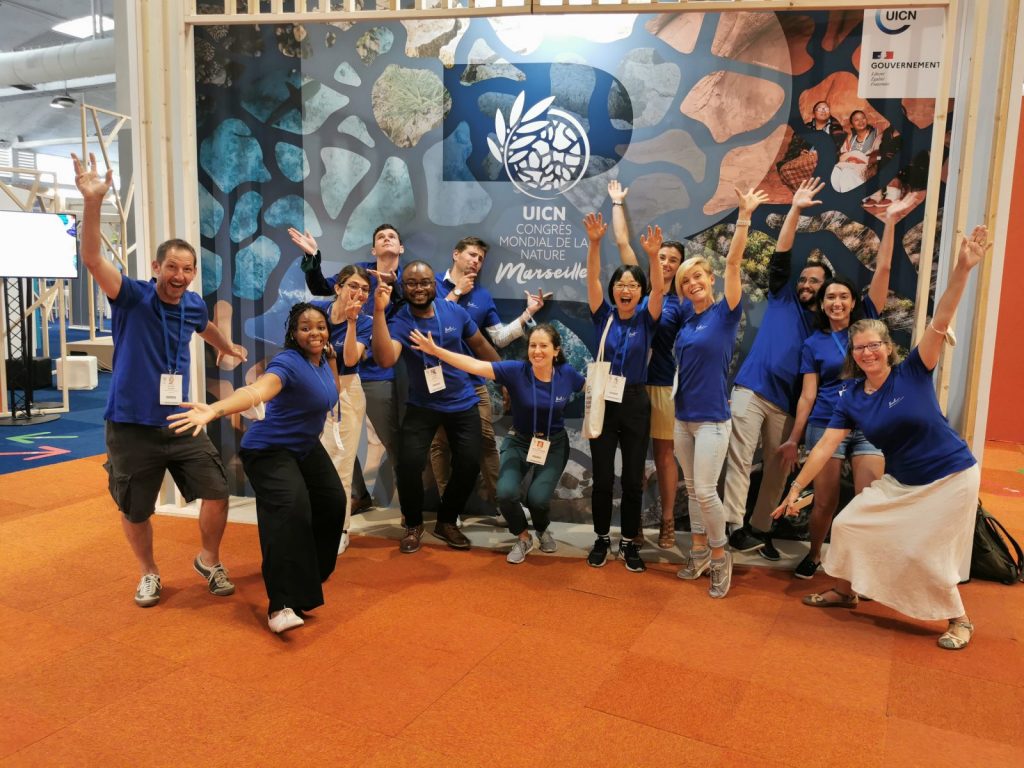
Travelling to Marseille
Every excellent adventure starts with an exciting trip. For the UNIL delegation, the Congress began at the Geneva train station around 11 a.m on September 2nd. This five-hour trip created a chance for the us to meet and get to know each other as we rushed through Geneva-Cornavin to find empty seats on the train to Lyon. Arriving at Marseille’s St-Charles train station in the middle of the afternoon, we experienced the premises of the congress very quickly: a hot, bustling, multicultural, and crowded metro station which was quite symbolic of what was to come at Congress.
The day ended with a welcoming dinner in the surprising La Tasca tapas restaurant: another excellent opportunity to unite us and discover Marseille’s fantastic atmosphere.



Experiencing the IUCN WCC
Volunteering!
As UNIL delegates, we also had to volunteer at the WCC. This meant that we could get an inside look into how the IUCN works and how Congress is managed. We had four categories of volunteering to choose from, Rapportuering in sessions, being part of the VIP staff, Virtual Channelling and working at the Pavilions. We volunteered for the 5 days (3 – 7 September) that the Pavilions and the Congress Sessions were running.
It was difficult to manage our expectations prior to our arrival as we had never attended an event of this magnitude in our professional careers. Bright eye’d and bushy-tailed, we were all anticipating what the opening day would be like. Whispers of Harrison Ford and the President Macron attending Congress, got most of us anxious about what we had gotten ourselves into when we agreed to volunteer. This was even more nerve-wracking for the three delegates who has signed-up as VIP Staff!
Volunteering as a rapporteur:
Students volunteering as rapporteurs teamed up with rapporteurs from IUCN to cover the highlights from the different sessions of the congress. During the first day of the congress, they covered high-level summits, such as the local action summit. During the following days of the congress, UNIL students covered topics on rights and governance, technology and innovation, youth and economics in conservation. Daily meetings were held with IUCN rapporteurs in order to organise tasks, exchange ideas, and identify the main takeaways of the different topics.
“Rapporteur – Intense, time consuming, but really interesting and enjoyable. It helps distill what speakers were saying and gets down to the core themes.”

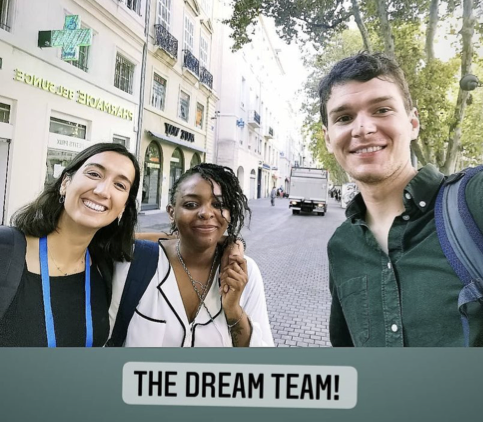
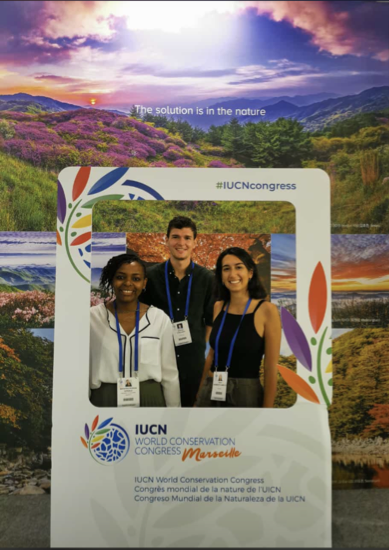
Volunteering at the Pavilions:
A number of students volunteered in the IUCN Nature-based solutions pavilion. There, they were responsible for helping prepare the pavilion before the start of the congress and during the congress. They were responsible for preparing the pavilion before each session and also encouraging the audience to participate in the activities planned in the pavilion, including taking the Ecosystem survey, marking the map of restoration plans, the VAR camera, and pledging to contribute to The Bonn Challenge (for more information, please visit https://www.bonnchallenge.org/). This gave the students a glimpse of the environmental and conservation industry as they were able to socialise with various participants and network whilst volunteering.
” During the volunteer experiences, I was responsible in the IUCN nature-based solutions pavilion, where I was present during various sessions and was in the process of preparing the room. Also, I was responsible for being present as a support member and assistant in some hybrid channels. During those sessions, apart from learning from the talks, I got a good idea of the requirements of holding an event and the different tasks that need to be done to have an organized session.”



Volunteering for the the virtual/hybrid channels:
Due to COVID19, IUCN decided to make Congress a hybrid event, which meant that participants could join sessions both virtually and in-person. The students responsible for this section were therefore present to help bridge the gap between session moderators and the technical staff. They were also assigned to support participants during online sessions. Each session had technical staff, the mediator/moderator, and an organiser. However, the volunteer had to be present in the session to make sure information was being communicated and understood clearly and to answer questions in case something was unclear. At the same time, they had to be on-hold in case any problem arose.
The responsibilities of the virtual channel volunteers is illustrated by the red dots in the diagram below.

The VIP section:
Three students were volunteering for the VIP panel, helping the IUCN staff widely used to prestigious events. As the 3rd of September was the opening day of the Congress, more than a hundred VIPs (donors, members of governments, NGO representatives, etc.) were present to attend the Opening Ceremony held by President Macron. The UNIL volunteers were at the disposal of the VIPs for the duration of the whole afternoon in order to guide them and give them the necessary assistance. Many of them were ministers, chiefs of governments, or major NGOs. In the days that followed the volunteers were mainly called to assist the VIP cocktails in the evening. They were responsible for welcoming the VIPs and filtering the entrances: an opportunity to create the first contact and engage in discussions with the VIPs during the cocktail events they attended. The volunteers were also called upon to guide VIPs in and around the Congress.
As the delegation members who volunteered for the VIP section mainly worked during the evening, they had the chance to attend many sessions of their choice during the day and make the most of Congress. In addition, working with the VIPs was a unique opportunity to network with senior officials from the IUCN secretariat and those from worlds of conservation and politics.



Participating in the sessions and networking!
Apart from the volunteering experience, attending the congress was a perfect chance for the delegation team to access several events and network. With many events happening simultaneously, each student got the opportunity to participate in the pavilions, the campus sessions, or the virtual/hybrid channels related to his/her interests. The congress was also a perfect chance for the students to find people or organisations that could help them in their current research and/or future employment.




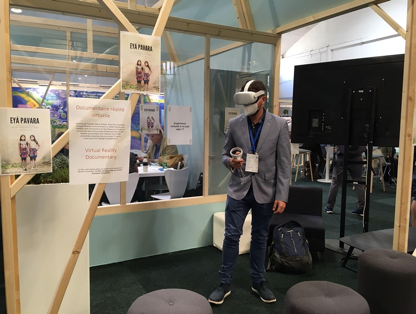

Other activities: Our visit to the Côte Bleue Marine Park
On September 3rd, some of us visited the Côte Bleue Marine Park, located in the Bouches-du-Rhône, between the industrialized basins of Marseille and Fos-sur-Mer. Being a protected area since 1983, it has managed to preserve its rich underwater biodiversity by reconciling the environment and the economy and working with all the stakeholders. It is also on the IUCN Green List of Protected Areas (https://iucngreenlist.org/sites/parc-marin-de-la-cote-bleue/). This was an interesting, fun educational visit that allowed us to learn more about conservation projects along the coast of the city of Marseille. We also got a chance have a quick swim in the warm Mediterranean Sea.
For more information on the park, please visit the website.



Meet the delegates
| Chanelle Adams is a second-year doctoral student of geography. Fulbright awardee Adams completed a BA at Brown University in STS and MA at the École des hautes études en sciences socials in Comparative Social Science Research. Her current research focuses on the globalization of plant medicine commodities from Madagascar, including market boom impacts on landscapes of value, meaning, and access. |
| David Amuzu is completing his doctoral studies in Geography at the University of Lausanne. David had his MPhil in Development studies-specializing in Geography at the Norwegian University of Science and Technology. He obtained his Bachelor’s degree in Geography at the premier University of Ghana. David has a strong research interest in sustainability transition in commodity production systems, business and biodiversity conservation, green economies, social values, value chain governance, innovation scaling, and political ecology. |
| Vasco Ferreira Da Costa is a second-year master’s student at UNIL, where he is pursuing a degree in Development and Environmental studies. For his thesis, he investigates the importance of mapping the needs of local populations in the development of conservation projects, mainly through participatory mapping methods that can complement GIS tools. |
| Yasmin Ghadyani is a second-year master’s student in Environmental science: Natural hazards and risk at UNIL. She is currently doing her internship at ON A MISSION, a non-profit organization that offsets carbon emissions by sustainable reforestation. |
| Camille Gilloots holds a master’s degree in environmental engineering and is currently pursuing a master’s degree in Sustainability at UNIL. Her research focuses on nature conservation by local communities in “Common Pool Resources” (E. Ostrom) in France. This work is highly linked with the identification of OECMs in the European context. In addition to this master’s thesis, she works for green transition policies of the Geneva area. |
| Antoine Guisan is Professor at the University of Lausanne, both at the Institute of Earth Surface Dynamics and at the Department of Ecology and Evolution, with primary interests in spatial ecology, macroecology, biogeography and conservation. His research focuses on the development and application of spatial models of species distributions, with main applications to the conservation of biodiversity under global changes. |
| Mia Kotur Corliss is a second-year master’s student at UNIL, where she is pursuing a degree in Behaviour, Evolution, and Conservation. For her thesis, she investigates the maternal effects on eggs in barn owls (_Tyto alba_). When not working with birds, she likes to relax by taking photos of them instead. |
| Astrid Oppliger Uribe is a Ph.D. candidate in Geography at the Université de Lausanne, where she investigates the science-policy nexus on forest hydrology issues through the production, circulation, and application of knowledge. She holds a Master of Science degree in risk governance and natural resources from the Universität Heidelberg (Germany); a specialization in Sustainable Development from the International Graduate School (IGS) North-South in Switzerland; and is a geographer from the Universidad de Chile. |
| Estelle Milliet is a second-year doctoral student in ecology and social sciences. After a Bachelor’s and Master’s in Biology at the University of Lausanne, her current research focuses on the collaboration between farmers and scientists and its impact on pro-environmental behaviors and on-farm biodiversity conservation. |
| Pierre-Louis Rey is a Ph.D. assistant student in the IDYST department, focused on spatial conservation planning. He wishes to improve the relationship between ecosystem services and biodiversity. For that, he develops an innovative tool to evaluate the value of ecosystem services for species and map the ecosystem services based on the species’ distributions models. This multi-disciplinary approach has a significant potential to help the stakeholders for a sustainable future. During the summer, Pierre-Louis enjoys the summer as a mountain guide to raise awareness about the importance of biodiversity. |
| Sonia Sarmiento Cabello is a master’s student in Behaviour, Ecology, and Conservation with computational specialization. Her master thesis focuses on studying genome-wide selective pressures on brown trout (Salmo trutta) to understand the consequences of conservation programs in the population in river Aare. |
| Samantha Sithole is a doctoral student at the Institute of Geography and Sustainability at UNIL. Her research is centered on conservation and natural resources governance and has touched on the militarisation of protected areas, and is now focused on youth in conservation on a global to the local level. She is passionate about youth participation in decision-making platforms within environmental governance structures. Samantha was a rapporteur in the youth stream at Congress and was the student – delegate and logistics coordinator for the UNIL Delegation. |
| Gretchen Walters is a professor at the University of Lausanne, at the Institute of Geography and Sustainability in the Faculty of Geosciences and the Environment. Her research focuses on conservation practice, protected areas and commons in western Europe and Central Africa, and the historical ecology of tropical forests and savannas. She coordinates the partnership for UNIL with IUCN. |
| Yan Wang has obtained her doctoral degree in Tourism studies at the University of Lausanne and a sustainable development certificate from International Graduate School (IGS) North-South. With years of experience in tourism and travel consultancy, she is interested in tourism and development, sustainability, heritage, and destination images in both global North and South. |
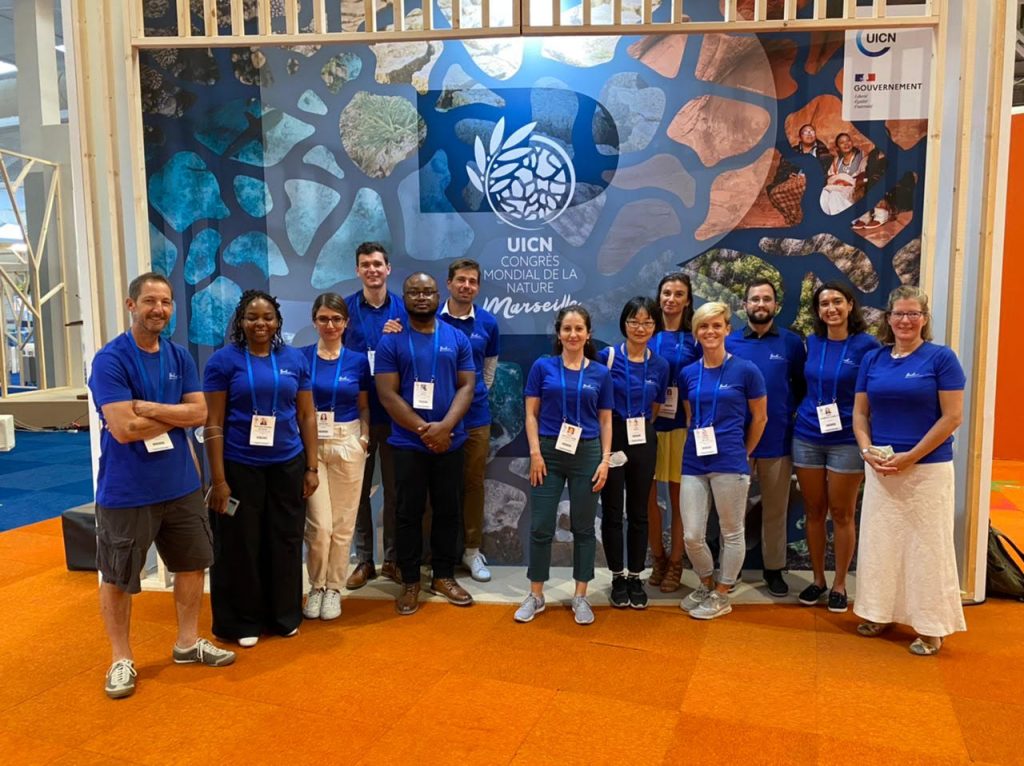
Our trip to Marseille and Congress in pictures

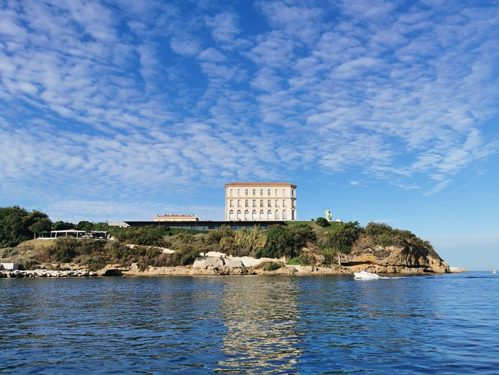


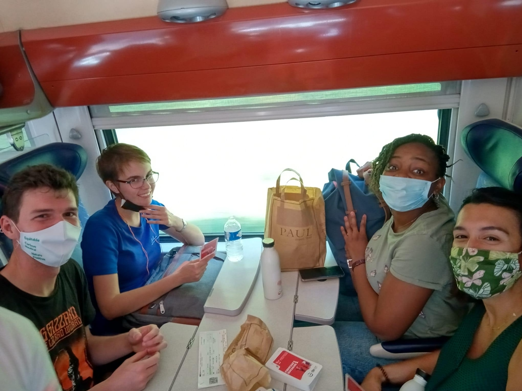
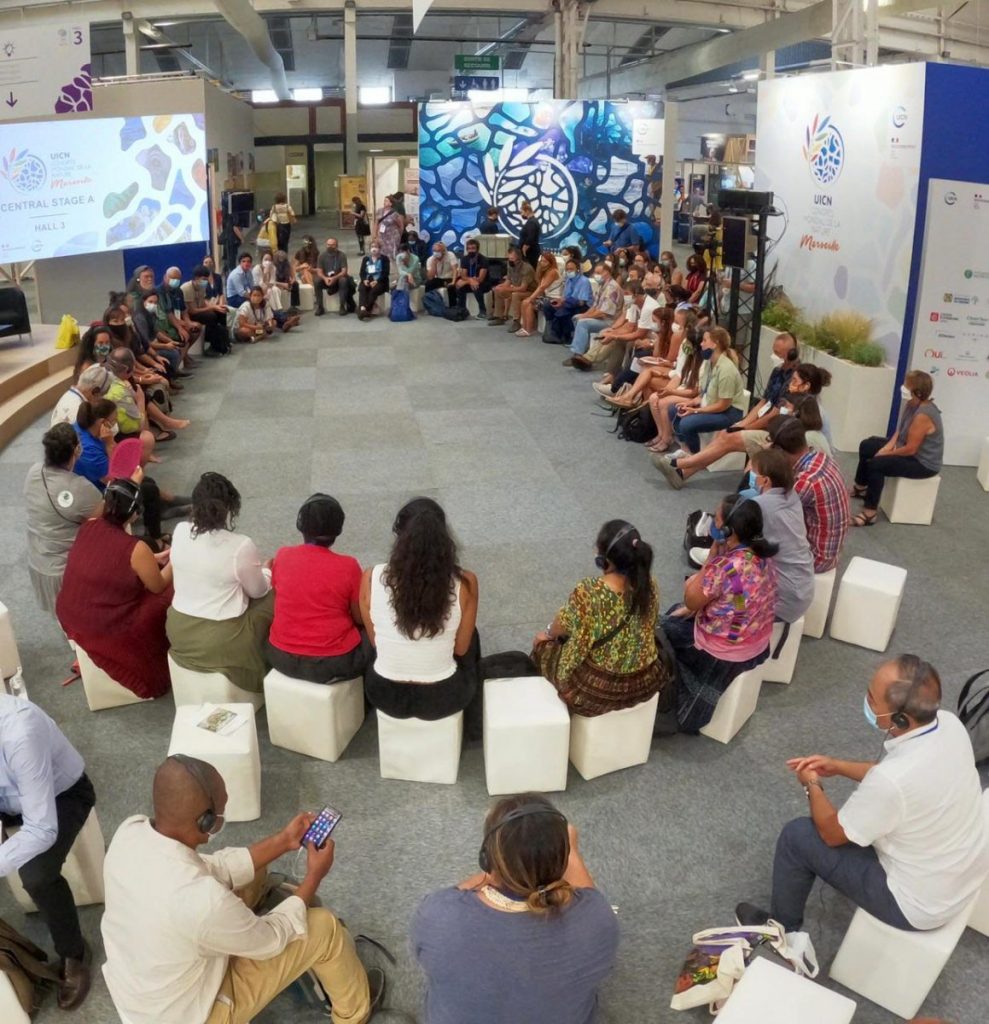
We hope in the future, more students like us, will be able to have this dynamic and educational experience at the upcoming IUCN WCC.
